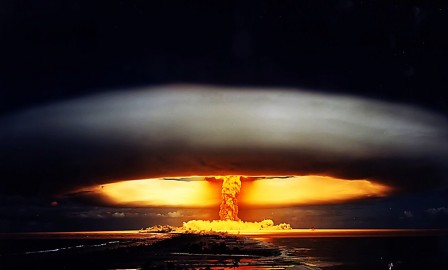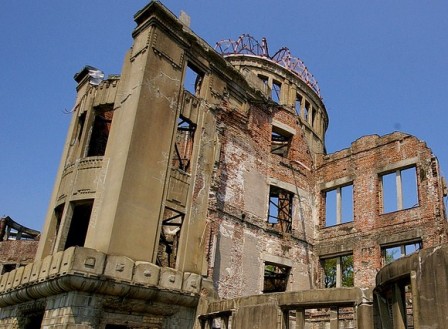Is A Nuclear Weapons Free World Possible?
Today is the first day of a two days nuclear security summit hosted by the United States. Leaders from 47 nations will attend the meeting aimed at securing uranium and plutonium stockpiles, and preventing non-state actors to acquire enough plutonium to manufacture a “dirty bomb”. However, nuclear non-proliferation is not enough; the goal of the international community should be a complete elimination of all nuclear weapons worldwide. But can such a daunting task be achieved?
On Sunday, President Obama said that “the single biggest threat to US security would be the possibility of a terrorist organization obtaining a nuclear weapon”. The objective of the Obama administration is to get concrete commitments from world leaders on securing stockpiles of plutonium and uranium, to ensure that they cannot be stolen and sold to extremists.
Last week, the United States signed a disarmament treaty with Russia, and the Obama administration defined a new US nuclear strategy limiting how Washington could use nuclear weapons. Some consider the treaty as a “landmark”, however it falls short of candidate Obama’s promises to push for a complete nuclear disarmament worldwide. The current nuclear security summit is supposed to lay the ground work for the United Nations Non-Proliferation Treaty review conference next month.
On April 8, UN Security General Ban Ki-moon and the UN nuclear watchdog welcomed the treaty between the US and Russia by which both nations pledged to slash their nuclear arsenal by a third.
“It is an important milestone in the international efforts to advance nuclear disarmament and to achieve a world free of nuclear weapons,” said Secretary General Ban Ki-moon. However, setting up the terms of a treaty for non-proliferation of nuclear weapons, which states such as North Korea and Iran could sign on, is a daunting challenge.
The International Commission on Nuclear Non-Proliferation and Disarmament was launched by Prime Minister Kevin Rudd of Australia and then Japan’s Prime Minister Yasuo Fukuda in 2008, after Rudd visited Hiroshima in July 2008. The commission’s report, released in 2009, is called “Eliminating nuclear threats: A practical agenda for global policymakers”, and is intended to provide analysis and focused policy recommendation ahead of the conference of the nuclear non-proliferation treaty.
The co-chairman of the commission, Gareth Evans, said the single mantra that most characterized the report was that, as long as any states had nuclear weapons, others would want them; and as long as states retained them, they were bound to use them one day, by accident or miscalculation if not by deliberate design.
“Nuclear weapons are the most inhumane weapons ever conceived, they inherently indiscriminate in those they kill and main, and have a deadly impact for decades. They are the only weapons ever invented that have the capacity to wholly destroy life on this planet, and the arsenals we now possess are able to do so many times over. The problem of nuclear weapons is at least equal to that of climate change in terms of gravity. Maintaining the status quo is not an option,” said the report.
Gareth Evans insists that serious progress must be made towards abolishing nuclear weapons completely.
“It is sheer dumb luck that we have succeeded as a world without a nuclear catastrophe since 1945, and not a function of good policy,” said Evans recently at a press conference.
To read the complete report from the International Commission on Nuclear Non-Proliferation and Disarmament click here.
Related Articles

















You must be logged in to post a comment Login